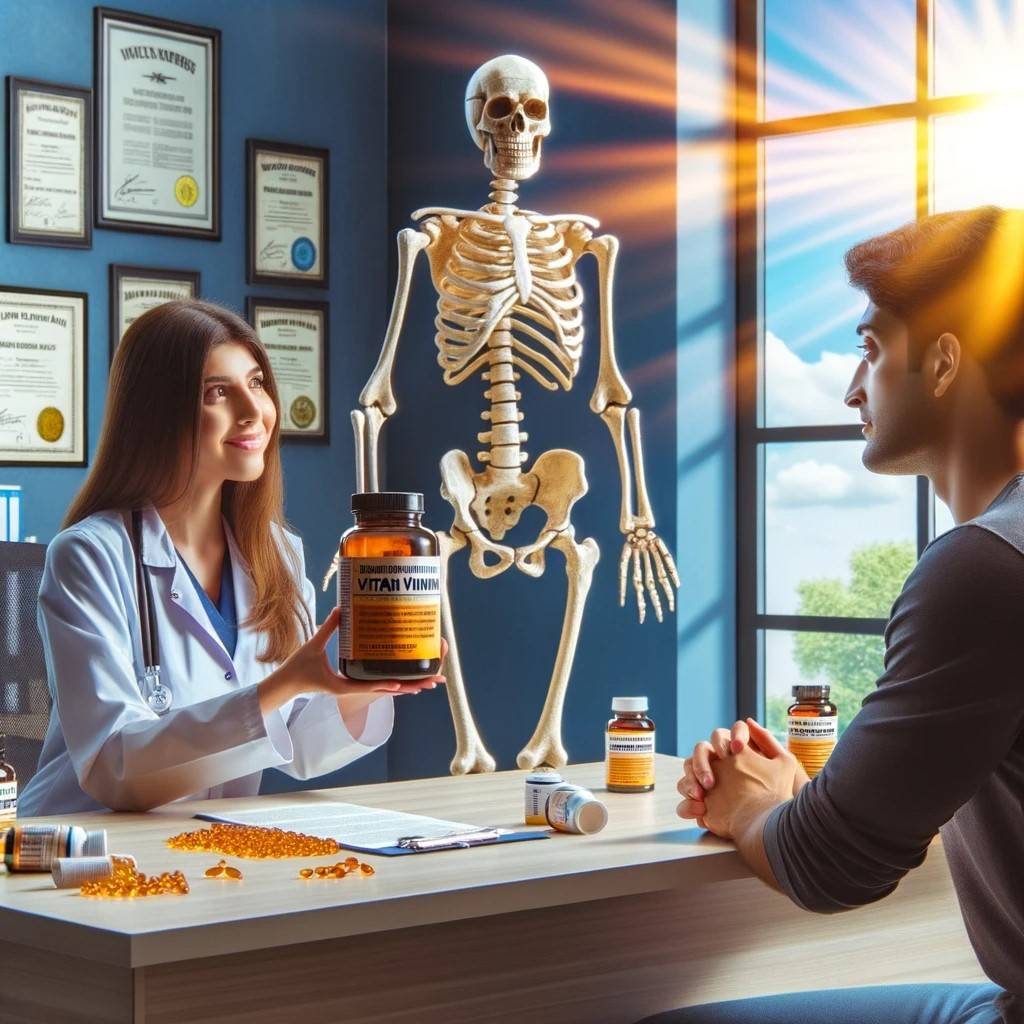Discover the best vitamins for strong bones and joints in our essential guide. Ensure your health with vitamins for Strong Bones and joints.
Introduction to Vitamins for Strong Bones and Joints:
This guide covers a lot of ground when it comes to vitamins that are important for keeping bones and joints strong. It is significant to understand the part these nutrients play, especially since bone and joint problems can affect people of all ages and backgrounds. We want to help you take steps toward a healthy future by giving you information about the vitamins your bones and joints need.
Understanding Bones and Joints

Our bodies are held together by bones and joints, which also make it easier to move. The body’s complex engineering can be seen in the way bones and joints work together. Bones provide support, and joints allow movement. As we age, our bodies change old bones with new ones. This is called remodelling, and it happens all the time. But things like age, diet, and living choices can have a big effect on joint health and bone density. Having less bone mass can cause diseases like osteoporosis, which makes bones weak and harder to break. In the same way, joints can get worn down over time, which can cause pain and make it hard to move around.
Best Vitamins for Strong Bones and Joints

Vitamin D: The Sunshine Vitamin
Vitamin D is significant for absorbing calcium, which is needed to keep bones strong and dense. A lot of people don’t get enough vitamin D, so many of them take pills to make up the difference. The sun is still one of the best places to get vitamin D, but we spend so much time indoors and wear sunscreen that we don’t get as much exposure. Vitamin D can also be found in smaller amounts in foods like egg yolks, beef liver, and fatty fish. The daily suggested amount varies, but bone pain and muscle weakness can be signs of a deficiency.
Calcium: The Building Block of Bones
Calcium is an important mineral for bone health because it is one of the building blocks of bones. You can get a lot of calcium from dairy, green leafy veggies, and some fish. However, balance is important, as getting too much calcium without enough other nutrients like Vitamins D and K can be bad for your health.
Vitamin K: The Unsung Hero
Vitamin K is significant for keeping joints healthy and building strong bones. Foods like meat, dairy, and green leafy veggies are sources. But it’s important to know that Vitamin K can affect how some medicines work. This is why it’s important to eat well and get professional help if you need it.
Magnesium: For Bone Density and Joint Flexibility
Maintaining bone mass and keeping joints flexible are both helped by magnesium. Whole grains, nuts, and seeds are all sources. Muscle cramps and weakness can be signs of a shortage, which shows how important it is for bone and joint health.
Vitamin C: Antioxidant Powerhouse
Vitamin C is a strong antioxidant that is essential for making collagen, a protein that keeps skin, joints, and bones healthy. Vitamin C can be found in large amounts in citrus fruits, strawberries, and bell peppers. It helps fight inflammation, which is good for both bones and joints because it is an antioxidant.
Other Nutrients and Minerals for Bone and Joint Health
It is well known that omega-3 fatty acids can reduce inflammation, which is significant for maintaining healthy joints. Flaxseeds and fish oil are significant sources. As a protein, collagen helps keep our joints in shape. People often get them from bone broth and vitamins. Trace minerals like phosphorus and zinc are also precious. Pumpkin seeds and meat are great places to get a lot of these minerals.
Lifestyle and Its Impact on Bone and Joint Health
Besides the Vitamins for Strong Bones and joints, there are a lot of lifestyle changes that impact our bone and joint health. For strong bones and joints, exercise is significant. Weight-bearing movements like walking and strength training are especially helpful. Nutrition is significant; a well-balanced diet gives you all the nutrients your bones and joints need to stay healthy. Lifestyle choices like smoking and drinking too much booze can be bad for you. Taking care of long-term illnesses like diabetes and rheumatoid arthritis is also precious because they can affect the health of your bones and joints.
Supplements and Medications
Bone and hip health can be improved with supplements, especially when the food you eat isn’t enough. But it’s important to be careful when using them because too much supplementation can have effects. Quality vitamins, with help from a professional, are significant. Some medicines can help, especially for managing diseases like arthritis and osteoporosis.
Consultation with Healthcare Professionals
It is important to get professional help, especially if you are at risk for bone and joint problems or are already having signs. A lot of different types of doctors, from general practitioners to experts like rheumatologists and orthopedic surgeons, play a part. Getting ready for a consultation means knowing your symptoms and medical background, which will lead to a more useful visit.
Conclusion about Vitamins for Strong Bones and Joints
Finally, vitamins for Strong Bones and Joints are essential for health and movement. Strong bone and joint health starts with a balanced diet rich in vitamins and minerals, a healthy lifestyle, and frequent exercise. Never delay in improving your health to ensure healthy bones and joints for years to come.
Frequently Asked Questions (FAQs) about Vitamins for Strong Bones and Joints
What is the best vitamin for joints and bones?
For maintaining strong joints and bones, Vitamin D stands out as the superstar. It plays a crucial role in calcium absorption in our bodies, ensuring that our bones stay hard and sturdy. Without enough Vitamin D, our bones can become brittle and prone to breaking. You can get Vitamin D from sunlight exposure, fatty fish, and fortified dairy products. So, make sure to soak up some sun and include these foods in your diet to keep your bones and joints in tip-top shape!
Which vitamin improves bones?
Vitamin D is a key player in improving bone health. It helps our body to absorb calcium, which is a fundamental building block for strong and healthy bones. Ensuring you have enough Vitamin D in your system can lead to improved bone density and a lower risk of fractures and osteoporosis as you age. You can boost your Vitamin D levels by spending time in sunlight, eating foods like salmon and fortified dairy products, or taking supplements if recommended by your healthcare provider.
How can I make my joints and bones strong?
To keep your joints and bones strong, you’ll want to focus on a combination of nutrition, physical activity, and lifestyle choices. Here’s a simple breakdown:
- Balanced Diet: Eat a variety of foods rich in calcium and Vitamin D. Dairy products, leafy green vegetables, and fatty fish are all excellent choices.
- Regular Exercise: Engage in weight-bearing exercises like walking, jogging, and strength training. These activities help to build bone density and keep your joints flexible.
- Maintain a Healthy Weight: Carrying excess weight can put additional stress on your joints, particularly your knees, hips, and back.
- Avoid Smoking and Limit Alcohol: Smoking can interfere with bone health, and excessive alcohol consumption can lead to bone loss.
What drink is excellent for bone density?
Milk is a fantastic drink for bone density because it’s packed with calcium and often fortified with vitamin D. These two nutrients work together to maintain strong and healthy bones. If you are lactose intolerant or don’t consume dairy, you can opt for fortified plant-based milk alternatives like almond or soy milk.
Is vitamin B12 good for bones?
Yes, Vitamin B12 does play a role in bone health. It’s involved in bone formation and maintaining bone density. A deficiency in Vitamin B12 has been linked to decreased bone density and an increased risk of fractures, especially in older adults. You can find Vitamin B12 in meats, fish, eggs, and dairy products. Ensuring you have enough B12, particularly as you age, is important for maintaining strong bones.
Which is the best tablet for joint pain?
Consult a doctor to discover the source of your joint pain and the best treatment. However, over-the-counter medicines like glucosamine and chondroitin may help decrease joint discomfort and cartilage health. These supplements may work differently for different people. Your doctor can help you choose the safest solution for your case.

Adel Galal is a health and wellness writer with over 30 years of experience studying and writing about health, fitness, nutrition, and healthy living. He is the founder of NextFitLife.com, where he shares practical, evidence-based guidance to support long-term health at any age. Adel’s mission is simple:
to help people make smarter health choices that fit real life, at any age.



